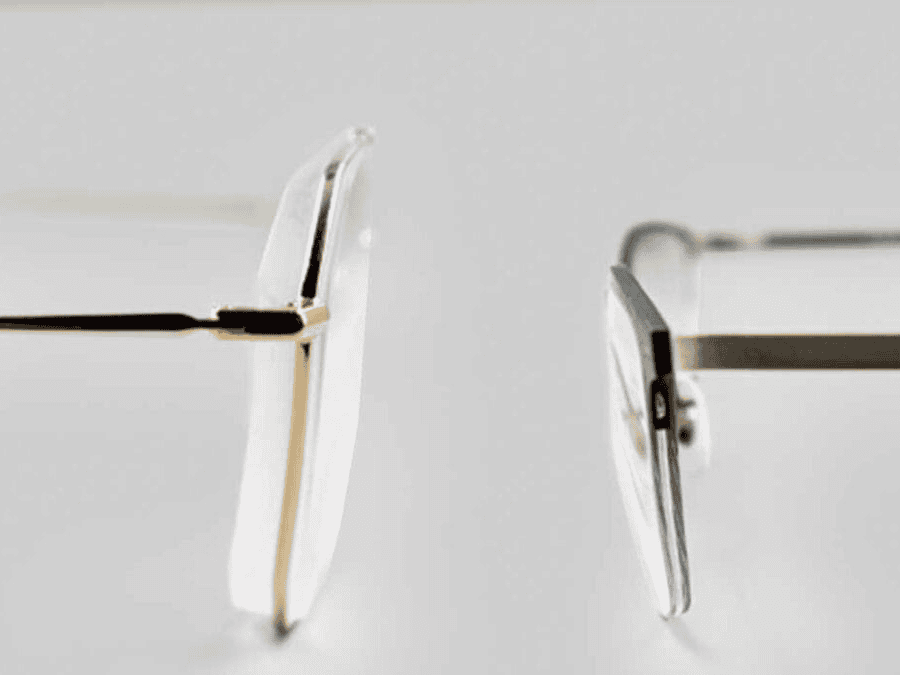Whether you’re purchasing your first pair of glasses or looking for a new set of frames you’ll want to understand the different factors that contribute to the thickness of your lenses, especially if you have a higher prescription. Having thick lenses can impact not just the appearance of your glasses, but also their comfort and weight. Here’s how you can ensure you get the slimmest lenses possible for your needs.
Note: If your prescription is less than +/- 3.50 you probably don’t need to worry about the thickness of your lenses.
Choosing the Right Frame Size and Shape
If you want thinner lenses in your glasses the single most important thing you can do is to choose a smaller frame, regardless of your prescription. Opt for the smallest frame that fits your face comfortably. Larger frames require thicker lenses, as the distance increases from the optical center to the edge of the frame the lens gradually grows thicker. For strong minus prescriptions, this results in thicker edges on your lenses, while for strong plus prescriptions, the center of the lens becomes thicker. By choosing a smaller frame, the lens width and height is reduced giving you an overall thinner lens.
It’s important to keep in mind that while smaller frames can lead to thinner lenses you can pick a frame that’s too small for your face. You’ll need to ensure that the frame fits correctly. If the frame is too wide or too narrow, your optical center will be misaligned leading to thicker lenses. Take the time to match the frame PD as close as possible to your PD for optimal results.
Last but not least you’ll want to avoid frame shapes with corners. Corners also increase the distance between the optical center and the edge of the frame creating thicker lenses.
If you’d like a more technical dive into how the size and shape of your frame affects your lenses, consider watching this video:
What About Lens Materials and Manufacturing?
You may have heard that different lens materials can lead to thinner lenses. While this can help, simply put, there is no magic lens material to guarantee thin lenses. Certain materials can be naturally thinner, but won’t always produce results. Most everyone will tell you that high-index lenses are the first solution to getting thin lenses, but in reality the results will vary due to different factors like frame size, frame fit, prescription strength and quality lens production.
Another myth is that free-form, digital, or HD lens manufacturing techniques can contribute to reduced thickness. In practice the difference is often minimal. These techniques primarily enhance vision clarity and precision rather than reducing lens thickness.
The Importance of a Quality Lab
If you’re using a vision care plan to get your frames and lenses, there’s a higher likelihood that your lens order will be sent to a substandard lab. Meaning your lenses may not be properly optimized which can lead to thicker lenses and suboptimal vision correction.
Having your lenses crafted at a high-quality lab is important. The expertise and equipment used in a top-tier lab can make a significant difference in the final product, giving proper optimization to your lenses. Contrary to what one might think a top-tier lab isn’t necessarily going to be a large corporate lab like Zeiss or Essilor. The best quality labs are often small independent labs, be sure to talk to your optician and find out who they use for lenses before ordering your glasses.
What to Remember When Shopping for your next Frame
When you’re out looking for your next pair of glasses the unfortunate truth is that not all opticians will know these things. When trying to optimize your lenses to be thin, you might be told that you can pick any frame shape or size as long as you use the highest index lens material. If you’ve been told that, you might want to consider looking for a new optician. One that understands the importance of picking a smaller frame that fits your face, using a quality lab and matching your frame to your PD. Don’t be afraid to speak up and ask questions when you meet with your optician to ensure that you get the thinnest lenses possible, your comfort is just as important as your vision.
Discover independent eyewear with Project Spex. Every Friday, we deliver the latest in collectible eyewear and your favorite independent designers.
Sign up now and never miss a thing!
About The Author:

Will Benjamin is an advocate for independent eyewear and one of the driving forces behind Project Spex. With a passion for unique, collectible, and limited-edition eyewear, Will aims to inspire people to build their own collections through Project Spex, while supporting the success of independent opticals.


